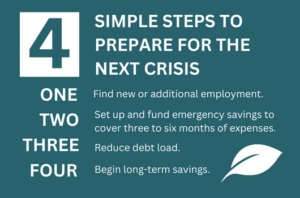
Remember what the world was like in 2019? Unemployment reached an all-time low, the economy was booming, businesses hadn’t been shut down due to a worldwide pandemic, and no one needed to shelter in place. Sadly, in early 2020, all of that changed, as we began searching for a new normal as we emerged slowly from an international crisis.
The “new normal” we moved into will affect all areas of our lives in ways we never before considered.
Many questions arose about how businesses would protect customers in the future, helping them feel safe in crowds of people. The financial repercussions of the global economic shutdown have been trickling down and will for years to come. This also means changes to our financial plans moving forward, personally, as well as for businesses and ministries. The pandemic has revealed the fragile financial picture of many Americans while stressing existing finances.
While the government stepped in at the onset of the pandemic and propped up the economy with stimulus money for individuals and businesses, unemployment still rose sharply, and companies that couldn’t weather the shutdown were forced to close. Individuals were forced to tap savings accumulated over the years. Some wiped out emergency funds and withdrew retirement savings to make ends meet.
Many families went from two incomes to no income in a very brief period. For families living paycheck to paycheck (78% of U.S. workers, according to a survey by CareerBuilder), this quick collapse of income resulted in high stress and worry. One in four workers had no funds set aside in savings. Thus, they had no safety net when they lost their jobs. Since many had no savings, they turned to credit card debt to sustain them until they received unemployment or stimulus money.
As social restrictions eased and the economy gradually reopened, those who were unprepared face a mountain of debt on top of everything else. They learned the hard way how fragile the economy and their livelihoods could be.
These extraordinary circumstances reminded us that even a few weeks of businesses being closed results in huge numbers of layoffs and complete disruption of normal, everyday life. As with any crisis, new knowledge is gained through the experience to help us prepare for the next major crisis.

This starts with resolving the issues accumulated during the most recent crisis. Find new or additional employment, set up and fund emergency savings to cover necessary expenses for three to six months, and reduce your debt load. Also, begin long-term savings at an adequate rate so as you age, your retirement years are not a stressful event. The better we prepare financially, the less stress we will feel the next time a crisis happens, whether a global pandemic or a personal crisis such as the loss of a job.
Rebuilding from a crisis like COVID-19 requires deliberate savings and retirement goals and paying down credit card and other debt to a manageable level. It will be a long road to financial recovery, but the lessons learned from this pandemic will help us be better prepared for the next big crisis.
For additional information, check out this seminar, which was recorded in 2020.

